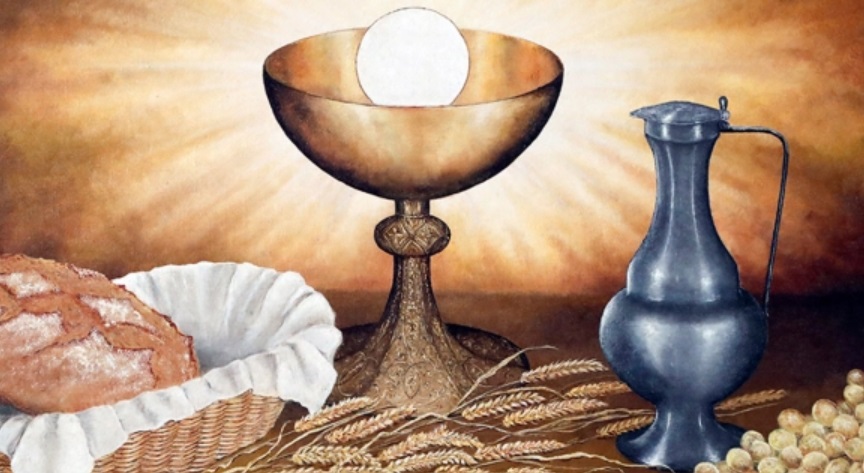Real presence of Christ is in the Eucharist
The Solemnity of Corpus Christi, or the Solemnity of the Most Holy Body and Blood of Christ, originated in France in the mid 13th century and was extended to the whole Church by Pope Urban IV in 1264. This feast reminds us of the mystical and physical manifestations of the Body of Christ, namely the
Jun 09, 2023

Reflecting on our Sunday Readings with Fr Philip Tay, OCD
The Most Holy Body and Blood of Christ (A)
Readings: Deuteronomy 8:2-3, 14-16;
1 Corinthians 10:16-17;
Gospel: John 6:51-58
The Solemnity of Corpus Christi, or the Solemnity of the Most Holy Body and Blood of Christ, originated in France in the mid 13th century and was extended to the whole Church by Pope Urban IV in 1264. This feast reminds us of the mystical and physical manifestations of the Body of Christ, namely the Holy Eucharist and the Church. However, the primary focus of this feast is still the Eucharist. This is echoed in the Catechism of the Catholic Church (1324-1327) which states that, “The Eucharist is ‘the source and summit’ of the Christian life.” The other sacraments, and indeed all ecclesiastical ministries and works of the apostolate, are bound up with the Eucharist and are oriented toward it. For in the blessed Eucharist is contained the whole spiritual good of the Church, namely, Christ Himself, our Pasch. At every Mass, our attention is called to the Eucharist and the Real Presence of Christ in it.
We know that in order for us to go about our daily life, we need physical food to nourish us and give us strength. However, we are not merely physical beings. We are all made of both body and soul. Therefore, we also need another kind of food that can nourish our spirits and souls. The food par excellence for our spirit is, of course, the Body and Blood of Christ in the Holy Eucharist, the food and drink that Jesus Himself gave to us under the form of bread and wine.
In the Gospel, Jesus says: “I Myself am the living bread that came down from heaven. Anyone who feeds on this bread will live forever. The bread I will give is My flesh for the life of the world.”
When we reflect on the word ‘hunger’, it teaches us something about the Eucharist. We are hungry not just for physical food but we must also hunger for food that will last, food that will give life to our souls. We know that without adequate food for our body, we become weak and cannot work. When we do not have enough nourishment in our bodies, our immune system will be lowered and we will fall prey easily to bodily sickness. In other words, without food, it would be difficult to live a meaningful life. We cannot enjoy health, work, learning and freedom without first attending to our hunger.
What applies to the body also applies to the soul. If our body craves for food that can give us the strength that we need to live, then our soul too would crave for food that can help us to live out our spiritual life. Without the nourishment that comes from the Eucharist, we risk the danger of becoming weak spiritually and incapable of reaching out to help others. We become easy victims to temptations and depression. But we also need to realise that the Eucharist does not rid us of our temptations. Rather, it gives us the strength and grace to resist these temptations when they come. Without the bread of life, we run the risk of losing our freedom in the spirit and become enslaved by the ways of the world. As the old adage goes, “not all that glitters is gold.” If we want to be truly alive and active in spirit, we need to receive the Eucharist as frequently as we can.
The secondary focus is that of the physical manifestation of the Body of Christ, seen in the Church. The Church is called the Body of Christ because of the intimate communion which Jesus shares with His disciples. He expresses this in the Gospels by using the metaphor of a body in which He is the head. This image helps keep in focus both the unity and the diversity of the Church. Receiving the Body of Christ i.e. the Eucharist, we receive the grace to live out our roles as different parts of the physical Body of Christ.
The question to ponder upon is this —when people see the Eucharist, they see or at least know that it represents the mystical Body of Christ. However, when people see the physical Body of Christ, which is represented by us, collectively as a Church, do people still see the Body of Christ or do they see something else? When we consume the Eucharist, we receive the presence of Jesus in our lives. If we have Jesus in our lives, then should not our lives reflect that presence as well?
Today’s feast reminds us of the need to be an effective witness – by being a united Body of Christ in the eyes of the world. Nourished by the mystical Body of Christ, we pray that we will all be transformed into the true physical Body of Christ, manifesting His presence in the world today.







Total Comments:0